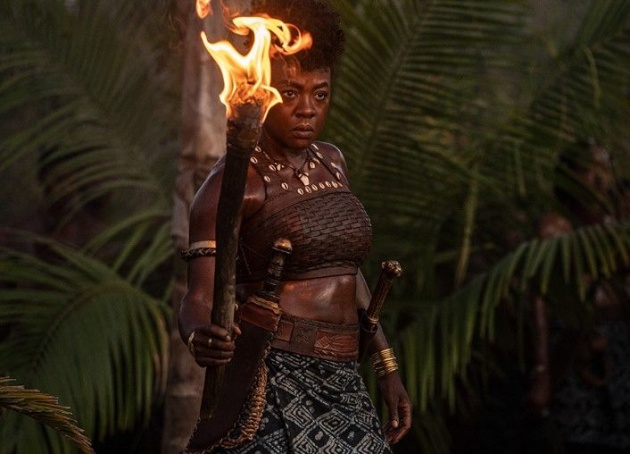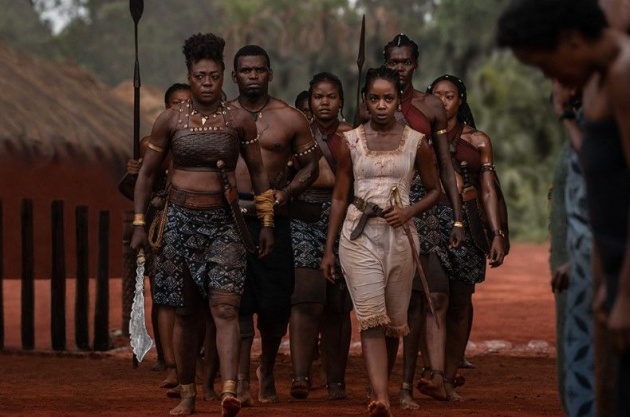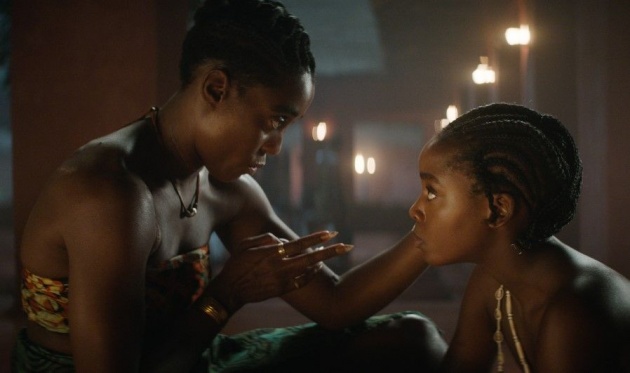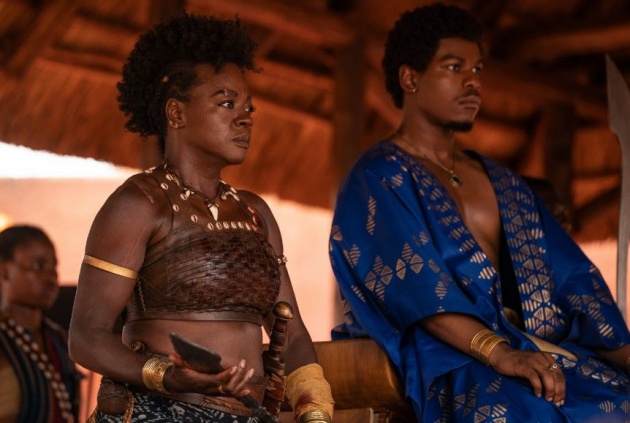
Pictured: Nanisca (Viola Davis), fearsome general of the Agojie in a scene from the historical action film, 'The Woman King', written by Dana Stevens and directed by Gina Prince-Bythewood. Still courtesy of Sony Pictures (US) / E. One (UK)
When I started this blog eight years ago, I did not envisage a Black American woman given $50 million to make an action-packed historical drama set in a country I’d never heard of. The Woman King, a modest box-office hit (domestic gross $63 million and counting) represents progress. Gina Prince-Bythewood didn’t write the screenplay (credited to Dana Stevens from a pitch by the actress Maria Bello) but proves the perfect match of director to subject matter; her previous credits include the Netflix superhero movie, The Old Guard, in which she demonstrated her action movie chops. Set in 1823 during the reign of King Ghezo (1818-58), The Woman King tells the story of a group of women warriors, the Agojie, led by Nanisca (Viola Davis) who defend Dahomey against a rival kingdom. It is a story of love, sacrifice and kicking men’s ass that hits every note it reaches for.
Dahomey, renamed Benin in 1975, is situated in West Africa, nestled between Togo and Nigeria, with a modest coastline. For a while, it was the centre of the slave trade. In the film, King Ghezo (John Boyega) permits the selling of prisoners as slaves, which leaves a nasty aftertaste. The film is defiantly anti-slavery, with European and Brazilian slavers and the Africans who help them cast as the villains, though according to the history books, Ghezo was pro-slave trade, giving him power and influence.
The film begins with the Agojie demonstrating their fighting prowess as they rescue a group of captured women from a village where the menfolk are late to the party. It features a signature move of a woman warrior leaping up, rolling on their opponent’s back, landing on their feet and stabbing their opponent in the chest. The film is rated PG-13, so we don’t see fountains of blood. The cast, including a scene stealing Lashana Lynch as Nanisca’s second-in-command, Izogie, do many of their own stunts. For a bulked-up Davis, in her mid-50s when production commenced, this is a significant feat.
The men, who lose in this encounter, are poor liars. ‘Where are the women prisoners?’ one man is asked. ‘We have no prisoners. We are poor farmers.’ One Agojie opens a hut door to reveal a group of women cowering in fear. The liar is suitably punished. The women, who would otherwise have been sold as slaves, are freed. Prisoners are taken. The Agojie return to a fortified enclosure. In reality, the journey back would have taken several days. The women would have complained of feeling hungry. However, this is a Hollywood movie and shortcuts – including the dialogue being spoken in English – must be taken. When they arrive back, the people who greet them bow their heads. No one must look at the Agojie, though Izogie encourages a child to snatch a quick peek.

Pictured: 'Avert your eyes. The Agojie return.' Nanisca (Viola Davis) leads a team of brave warriors in a scene from the historical action drama, 'The Woman King', written by Dana Stevens and directed by Gina Prince-Bythewood. Still courtesy of Sony Pictures (US) / E. One (UK)
Nanisca is a formidable leader, whose battle scars, including one above her right eye, are clearly visible. You see the cost of being a woman warrior and also her seriousness. The Agojie don’t take husbands but instead dedicate themselves to training and fighting. Just as we never see men falling for other men in other films where warriors train in close proximity, so the women don’t fall for each other. Some cliches are left unchallenged.
Why do very few men, including the King himself, fight for Dahomey? This isn’t explained. In reality, Ghezo took the throne from his older brother, Adandozan, but you’d never guess that he is a fighting man. ‘Dahomey has a new king,’ we are told and for the purposes of the movie, we see young Ghezo learning the ropes and taking advice from a trusted few. He has a glamorous wife, Shante (Jayme Lawson) who is critiqued as a proto-typical Black American Princess, devoted to her looks rather than physically defending the kingdom. She tries to supplant Nanisca as chief influencer, though Ghezo respects the Agojie leader.
Our principal viewpoint character, Nawi (Thuso Mbedu) is introduced fifteen minutes into the film, a young woman who is told that she will require a wedding dress. She is to be married off to a brutal older man, who strikes her when she raises an objection. Naturally, she refuses him and is instead taken by her father to be handed over as a gift to the king. Once she passes through a certain doorway, she will train as an Agojie, renouncing marriage for the rest of her life. One can only assume that in the film’s Dahomey, there are more women than men of a young age.

Pictured: A lesson in courage. Izogie (Lashana Lynch) and Nawi (Thuso Mbedu) in a scene from the historical action drama, 'The Woman King', written by Dana Stevens and directed by Gina Prince-Bythewood. Still courtesy of Sony Pictures (US) / E. One (UK)
Nanisca and Izogie train Nawi and the other rookie Agojie. Their training enclosure is seen as a relative paradise. Former prisoners from outside Dahomey can also train there. We hear two young women argue. Nawi – and by extension the audience – is on the side of the outsider. This is a film that is pro-integration.
Early on, Nawi is taught to wield her first weapon, a thin stretch of rope. While others make nooses, Nawi objects. She is given a sword to strike the head off a straw dummy, but barely troubles its neck. Nanisca demonstrates her and the sword’s power by swiftly decapitating the dummy. Nawi is awestruck. Izogie takes pity on Nawi. In many of her scenes, Lynch adopts a poker face; she is almost as deadpan as Buster Keaton.
Meanwhile, a group of (male) warriors from the Oyo (now Nigeria) led by Oba Ade (Jimmy Odukoya) arrives at Ghezo’s fortification. Nanisca and Oba Ade have, as the expression goes, previous. Held captive in her younger years, Nanisca was raped by Oba Ade and his men. She shudders in his presence. However, there is more – involving a shark’s tooth.
Oba Ade will allow Dahomey to have access to the port so long as King Ghezo pays the tribute, which includes Agojie women. He is treated to Dahomey hospitality. When Nanisca and her warriors arrive at the port, they bring not a tribute, but a sack containing three Oyo heads. In the ensuing fight, the majority of the Agojie flee, but Nawi and Nanisca are left behind. She brings down a gate preventing reinforcements from arriving. Nawi helps Nanisca escape but is scolded in front of other Agojie. ‘You didn’t follow the plan,’ she is told. It is clear that Nanisca intended her port visit to be a suicide mission in which she would fight Oba Ade to the death.
The Agojie aren’t supposed to draw the eyes of men, but Nawi is noticed by Malik (Jordan Bolger), a half-Brazilian, half-Dahomey slave trader, after they meet outside Ghezo’s fortification. Malik and Santo (Hero Fiennes Tiffin) visit Ghezo, Malik declaring his parentage. ‘Welcome home,’ he is told. Needless to say, the alone time that Malik and Nawi spend together is frowned upon.
Nawi represents a challenge to the Agojie’s ways. During an assault course that involves struggling through a briar bush – one with razor sharp ends - Nawi helps another competitor. She wins the race but is told, ‘you aren’t supposed to help others.’ Nawi cannot help herself. She and Nanisca also spend some time together in a pool, when Nanisca notices something on Nawi’s shoulder.

Pictured: Providing wise counsel, Nanisca (Viola Davis, left) with King Ghezo (John Boyega) in a scene from the historical action drama, 'The Woman King', written by Dana Stevens and directed by Gina Prince-Bythewood. Still courtesy of Sony Pictures (US) / E. One (UK)
The film follows the traditional beats of a Hollywood action thriller, including a tragedy that befalls a major character. There was an audible gasp from viewers at the screening I attended. The film builds to a final confrontation between Nanisca and Oba Ade which is as visceral as any sequence in the film.
Viola Davis is a commanding presence in many of her films but here she steps up to another level. This establishes her as a bona fide action star. Boyega takes a back seat to the female cast but has scenes that suggest Ghezo’s fragile benevolence.
At its core, the film is about the evolution of the Agojie. The slave trade is challenged but not ended. There is a coronation of sorts, suggested by the film’s title, and also a moment of tenderness.
The Woman King is an entertaining crowd-pleaser. The Agojie finally have it all, displaying fearsome strength and accepting the male gaze. I didn’t entirely believe in Nawi as the next-level super-warrior, but I was not averse to the film’s wish fulfilment. The action choreography is impressive; it is a pleasure to watch a film that isn’t heavily reliant on digital effects. The human drama at the centre of the film resonates. Prince-Bythewood doesn’t rewrite Dahomey’s history but instead celebrates the women who played a central part. The film owes a debt to Ryan Coogler’s comic-book film, Black Panther in which women warriors fought alongside the titular hero. That Prince-Bythewood was able to build on a male director’s success is no bad thing.
Reviewed at Cineworld Leicester Square, Screen Seven, Central London, Tuesday 25 October 2022, 17:10 screening



